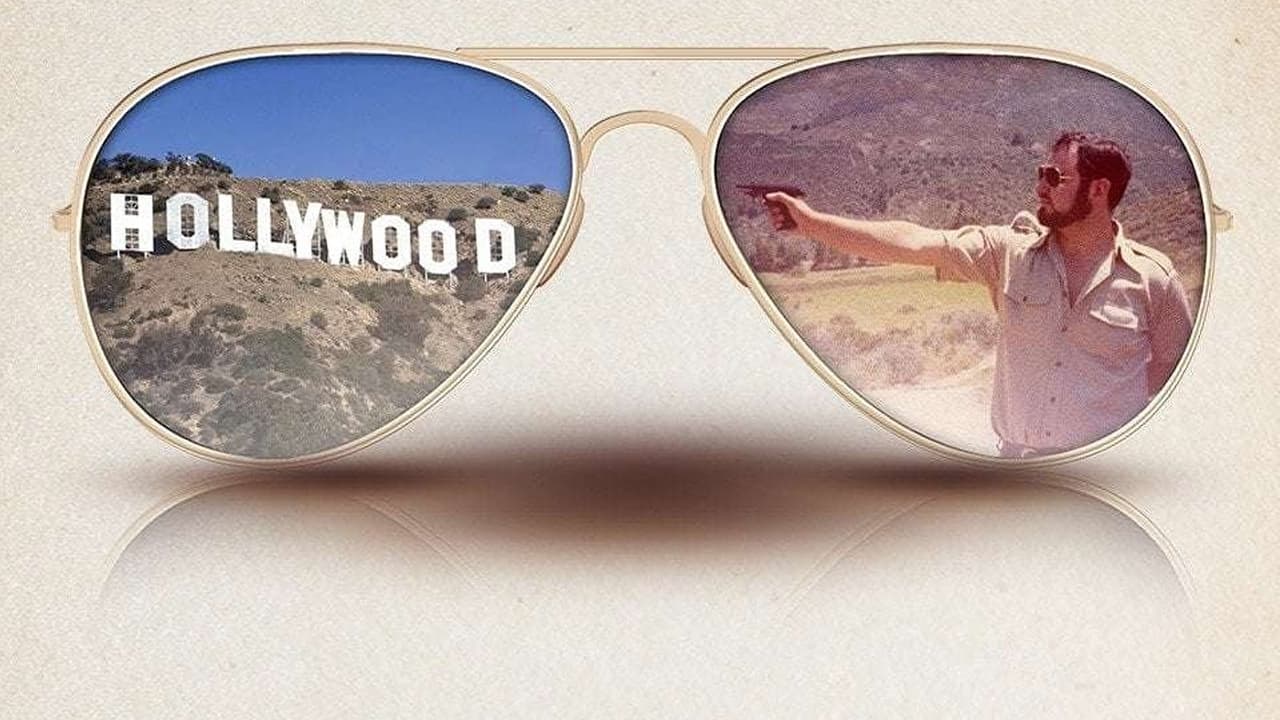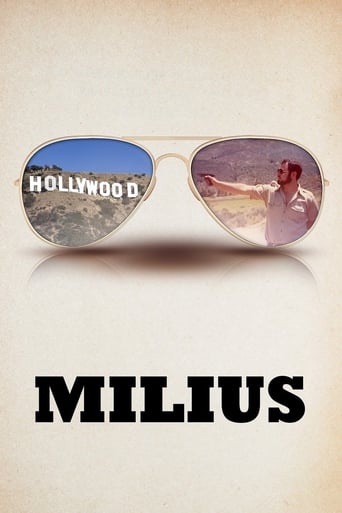

When people usually think about the filmmakers of New Hollywood, the first name that comes to mind certainly isn't John Milius. The most commonly remembered names of that period are "The Big Four:" Spielberg, Lucas, Coppola, and Scorsese. Even Brian De Palma may come to mind. But almost nobody thinks of Milius. Which is a shame, because he seems to be one helluva talent.This documentary covers most aspects of John Milius's life from his childhood to his stroke and continuing recovery (at that time). His whole career from his writing efforts to his few directorial projects have quite a bit of focus as well. He is probably best known as one of the screenwriters for Apocalypse Now, for which he got an Oscar nomination. Some may not even realize that he helped come up with dialogue like Dirty Harry's "'Do I feel lucky'" speech, or the Indianapolis monologue in Jaws. To know that he did both is bound to increase one's respect for his talent. What makes this documentary even more fun is that it feels like quite the party with all sorts of directors who knew him and were inspired by him participating, as well as many famous actors. I mean, you have guys like Spielberg, Lucas, Scorsese, Clint Eastwood, Arnie, Stallone, and Harrison Ford all giving their thoughts on the man. And I'm just getting warmed up. You hardly ever see this much major talent participating in a documentary like this. It makes you feel like you're a new friend to all these guys and by the end, you really feel like their buddy.Prior to this documentary, I've only seen one Milius film: Conan the Barbarian (1982), and it's a film I've loved more over time. Now that I've seen this documentary, I want to seek out more of his work, since he has specialized in big budget epics and one of the most common things that the interviewees in this documentary have cited him for is the way he writes dialogue. Knowing now about his efforts on Dirty Harry and Jaws, as well as Apocalypse Now, I believe it. Milius may not have a personality that is comfortable with everyone: George Lucas remembers a story of how Milius punched his film professor, he's been accused of being right-wing in a system that veers more towards the left, he's pro-war, and he seemed to love pushing people's buttons, but the more you understand Milius, the more you respect him. I may not agree with everything he believes in, but I won't deny what he's contributed to the film industry.Before Milius suffered his stroke, he was working on a movie based on the life of Genghis Khan. However, it's been a while and the project doesn't seem to be reaching the daylight. Given how much work he put into Conan, a similar film, I hope that he can still make the film, given how much he seems to believe in it. You can do it, John. I know you can.
... View MoreThis documentary is about a Hollywood legend who deliberately cultured an anarchistic and ultra-macho persona—one that irritated the life out of many of the politically correct in Hollywood. However, for some time, the film industry had to put up with John Milius' strangeness because the man was extremely successful. With films like "Dirty Harry", "Magnum Force", "The Wind and the Lion" and "Apocalypse Now" to his writing credits, he was greatly in demand and was friends with the biggest names in Hollywood—like George Lucas and Steven Spielberg. However, in recent years, Milius' output on the screen has dropped considerably and the prestige of his projects has dropped. And, in the last few years, his output has dropped to nothing. What happened? What led to this fall?The film begins with a very brief discussion of Milius' childhood but spends most of the early part of the film talking about his time in film school—where he attended classes with the two men mentioned above as well as a few other future filmmakers. It then proceeds to discuss his projects chronologically—and pays special attention to his most successful and critically acclaimed pictures. Additionally, I noticed that Milius' IMDb credits actually are missing much of his work, as he was apparently the go-to man when producers needed re-writes or wanted to punch up scenes—such as when he contributed some dialog for the films "Jaws" and "The Hunt for Red October". His track record during this time was pretty amazing. But as I mentioned above, there was a fall—but I really don't want to say more, as it would spoil the film.The best thing going for this film is how much many ultra-famous people love and respect Milius. Because of this, TONS of exceptionally big names contribute to the film—such as Clint Eastwood, Sam Elliott, Oliver Stone (who didn't seem to like him but respected his abilities), Francis Ford Coppola, Richard Dreyfus, Harrison Ford, Steven Spielberg, George Lucas, Martin Scorsese, Arnold Schwarzenegger and many, many more. Even a bad documentary would be great and well worth seeing with these folks appearing in it!! And, fortunately, this is NOT a bad film at all. It is a loving portrait of a strange and deliberately out of sync man. Think about it—in the bastion of liberal thinking, Hollywood, Milius was serving as an officer for the NRA and would carry guns about him to meetings with studio execs!! I admire someone who deliberately tweaks the noses of those around them, as provocateurs make like a lot more interesting!Additionally, the film is well-constructed, filled with wonderful clips and archival footage, is fascinating and you cannot help but gain an appreciation for this very odd man. Well worth seeing—especially for anyone who wants to be somebody in the film business.
... View More"Milius" admirably susses out the life and essence of director, writer and movie maven John Milius, and does so without resorting to hagiography or caricature. Milius the man and the notion put the hook in me, to use his own expression, with his script for "Apocalypse Now" from 1979. He is a master of the outsize soliloquy that is relevant, indelible, written in urgent flaming large font, and always delivered with a sub rosa wink and nod. Milius in life is as bombastic, vexing and complex as his characters, and labels, slogans, and cliché cannot describe him. The filmmakers here do an exceptional job of getting past hype and drama to really figure out what makes Milius tick (or tock, as the case often is). One wishes Coppola in this film were more forthcoming with what must surely be deep insights into Milius he possesses, but aside from this dry spot, "Milius" is a nicely-woven film and warrants a watch.
... View MoreTo casual moviegoers, the name John Milius is probably not one that is instantly recognizable. Although he worked steadily throughout the 1970s and 1980s, the director never achieved the marquee name status of his contemporaries like George Lucas, Steven Spielberg, and Martin Scorsese. However, to huge film buffs, Milius has long been seen as an underrated and, in some genres, iconic auteur responsible for having a hand, either as a screenwriter or director, in creating some of the greatest films action ever made. MILIUS, the new documentary by Joey Figueroa and Zak Knutson, aims to give Milius his due and shine a light on the filmmaker's life and contributions to cinema.Perhaps the most immediately striking aspect of MILIUS is just how many of Milius' famous fellow filmmakers Figuerora and Knutson were able to get together for interviews. The list of famous directors who serve as talking heads here is simply staggering: George Lucas, Steven Spielberg, Martin Scorsese, Francis Ford Coppola, and Oliver Stone are only a few of the names that appear to pay tribute to their old friend. In a lesser documentary, these men would simply show up, say a few brief general sound bites about the nature of the film industry, and the result would be a minute or two of screen time for the sake of having household names in the film. This is not the case with MILIUS as everyone interviewed seems to genuinely care and have great interest in both the documentary's subject as both a filmmaker and as a man. Nobody appears bored or uninvolved at any point. And in an industry where some directors wants to take credit for everything, it's refreshing to see these filmmakers share stories of how valuable Milius was on films that they directed that could therefore be seen as "their films." In particular, Coppola comes across as greatly appreciative for having Milius as a co-writer on APOLCALYPSE NOW, and Spielberg smiles with glee as he retells the story of how Milius wrote a famous monologue from JAWS. It is in these scenes that Figueroa and Knutson do a fantastic job of highlighting Milius' great, although often uncredited or ignored, work as a screenwriter. As screen writing in general is a subject that is often either overshadowed or minimized by the subject of directing in documentaries, this is by far one of the most engaging and interesting sections of the film.Because Figueroa and Knutson do such an incredible job covering Milius' screen writing career, it's disappointing that some of the movies he directed are discussed less than they should be. In terms of box office and cultural impact, Milius' 1982 adaptation of Conan the Barbarian is his best commercially successful movie, so it's a bit strange that the segment on that movie only lasts about five minutes. It's almost like the segment is in there for obligatory reasons from the way it seems glossed over in some respects. Arnold Schwarzenegger shows up to discuss how the character of Conan impacted his career and it's hinted at why Milius didn't return to the franchise, but there is much more that could have been said about the film that is considered by many to be a classic. Still, what is featured in the segment in regards to behind-the-scenes footage and production stills is informative and entertaining.As MILIUS reaches its conclusion, the last twenty-five years or so of Milius' career are somewhat skimmed over, partly due to the fact that Milius hasn't been given as many career opportunities as he once had, but mainly because the filmmakers have a much more important topic to discuss: the stroke that left Milius suffered a few years ago. The details regarding the aftermath of his stroke are filled in by Milius' children and his close friends, and it's at this point that the documentary becomes something deeper. Alternating between incredibly sad and incredibly inspiring, the last act of MILIUS is the most powerful part of any documentary I've seen in quite some time. Milius refuses to let the last few years of setbacks stop him from continuing to work as he continues to write his long-in-development Ghenghis Khan biopic, which sounds like it has the potential to be the best project Milius has ever done. When the end credits of MILIUS roll, there is a complete picture of an extremely talented, tough, and larger than life man, one who still has plenty left to say and several more stories to tell, either on paper or on screen. Watching MILIUS makes one eagerly await the big screen return of a fascinating filmmaker, hopefully sooner rather than later. Highly recommended. 9/10
... View More